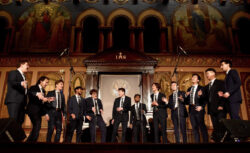The tensest moments of recent public conflict between student groups involved the politics of the Middle East. Groups such as the Muslim Student Association, the Jewish Student Association, the Young Arab Leadership Alliance and the Georgetown Israel Alliance have been especially active on campus in recent years, staging events, bringing speakers to campus and trying to foster debate or at least raise awareness of what they see as an important issue on a seemingly daily basis.
They have also been known for their disagreements, which have been well-publicized on campus. Having announced the creation of a new Special Assistant position to work with groups across campus experiencing conflict, it seems that even Vice President of Student Affairs Juan Gonzalez has felt the need to do something to help alleviate tension. When asked, Gonzalez denied that the administrator was intended to deal with any specific groups on campus. But it is hard to imagine the individual hired for the job not having to deal with the aforementoned groups, as they are some of the most visibly active on campus and, in the case of YALA and GIA, are more politically opposed than most. Other campus groups that can be paired off as opposites maintain relatively low profiles. College Democrats and College Republicans generally avoid high-octane shouting matches, and most of the other groups that produce controversial events have no ideological opposite against which to compete. Georgetown Solidarity Committee, for example, has no foil in the form of a GU Neoliberalists Club.
Thus, it would seem that the groups that deal with the Middle East are somewhat unique. But this semester, they have made themselves all the more so unique by taking the initiative to reverse the established pattern: They have begun to talk to each other.
The transformation has mostly been an informal one, between individuals, with some more interested than others. But the students that are reaching out have begun to do the things that acquaintances do. They are talking in Red Square. They are keeping each other informed of upcoming events. They are exchanging cell phone numbers.
Julia Segall (CAS ‘05), president of GIA, noted how her group’s interactions with YALA had changed.
“Last year was a really hard year for everybody,” she said. “There was a lot of tension and a lot of stress between the two groups, but this year, we always have our ups and downs, but I think that it’s been a lot better.”
Samer Oweida (SFS ‘04), a member of YALA’s executive board, noted how the mere act of talking to each other, epsecially after controversial events, has helped improve relations.
“I would say that that’s the most [communication] that I’ve come across since I’ve gotten here,” he added.
Relations may have also improved since last year because members of the groups have begun to look past each others’ political views.
“I know that I can talk to the leaders of YALA and I know that they respect me and I respect them,” Segall said. “Last year I think we could have needed this more. But this year I feel like everybody is realizing that everybody is a student here and that we’re all classmates.”
Director of Student Organizations Martha Swanson, who has frequent contact with student leaders, agreed.
“There was probably some mistrust, perhaps, last year,” she said, but added that relations seemed to improve in the spring. She also pointed to communication as essential to help the groups “respect each other more as students, and less as members of political or religious organizations.”
MSA and JSA leaders have experienced a similar shift in relations with each other.
“I didn’t know what to expect this year,” said MSA Treasurer Nabeel Yousef (SFS ‘05). But after talking more, he has “realized we were more on the same page.”
JSA President Dan Spector (SFS ‘04) voiced the same optimism.
“She and I talk all the time,” he said of his relationship with MSA President Maisoon Al-Suweidan (SFS ‘04). “Things are going quite a bit better than they did in years past.”
Earlier this year, the four groups took a step forward by coming together to sponsor the Jewish-Palestinian Living Room Dialogues, an event that featured Muslim and Jewish speakers telling their personal stories and discussing how they have been taught about the conflict.
“It worked really well at Georgetown,” Spector said. “It takes politics out of the issue and they want you to see other people not as Palestinians or Jews or Arabs or Christians but as other people with stories. It’s simple but it’s a different way of looking at it than, ‘You give your perspective’ and ‘I give my perspective,’” he said.
Still in the spotlight
“We’re the most publicized,” said Segall of the Middle East issue’s high profile on campus. “I feel like were kind of put on stage to fight with each other, it’s the Jews versus the Arabs and the rest of the campus just watches.”
But the thaw in relations demonstrates that campus political life doesn’t have to always mirror international events; even as students stay involved in political issues, they can make progress in their own way on campus. Students have taken the initiative to promote a dialogue, hoping at the least to ease tensions at the local level.
But the conflict still looms large, and for now, the leaders of these groups are learning to forge lines of communication with people that they often strongly disagree with.
“We basically have agreed to disagree about politics,” said Spector. “There is a line that we are trying hard not to cross.”
In many respects, though, the debate has remained as potent as ever. On Oct. 22, JSA and GIA sponsored two speakers who delivered a talk entitled “Ideology of Jihad, Dhimmitude and Human Rights” to an audience of about 70 students. Like many events before it, the talk incited controversy and even outrage. But the episode didn’t prove as divisive as it might have. Maher Bitar (SFS ‘06), who is a Christian Palestinian, described how he spoke with Segall after the event and she apologized to him for the speakers’ comments.
“That’s the good thing about Georgetown, that this was happening and it didn’t really polarize the two sides,” said Bitar. “They [student leaders] actually stepped outside the room and started talking. MSA and YALA asked for an apology, and they got one the next day, and that was that.”
The future?
“Our groups, more so than other groups on Georgetown’s campus, our issues strike home,” said Oweida. “This is something that is very difficult to make P-C [politically correct] because in all of our eyes, it’s not a P-C subject.” He also emphasized that while “the lines of communication have only been getting better,” the debate will not lose any of its intensity.
“I’m not backing down from what I believe, and I feel that the people from the groups that were talking to aren’t backing down from what they believe,” he said.
For Segall, the debate will probably continue to incite impassioned feelings.
“It hasn’t really been in the past, and it isn’t now, the intent of our events to be controversial,” she said. “And the thing is, that we ourselves haven’t really thought of our events as controversial. The problem is that when you have a subject like the conflict in the Middle East, no matter what you do its controversial.”
It’s hard to say how the new Special Assistant to the Vice President will interact with these groups. According to Gonzalez, the administrator will typically only work with groups that seek assistance, but might be asked to work with specific groups in some cases.
Oweida emphasized that whatever the role of the Special Assistant, student groups “shouldn’t have to restrict what they have to say because it’s offensive to the other side.”
Doing so would no doubt do more harm than good.
“The situation should be offensive to humanity,” he said.”It’s that bad.”






